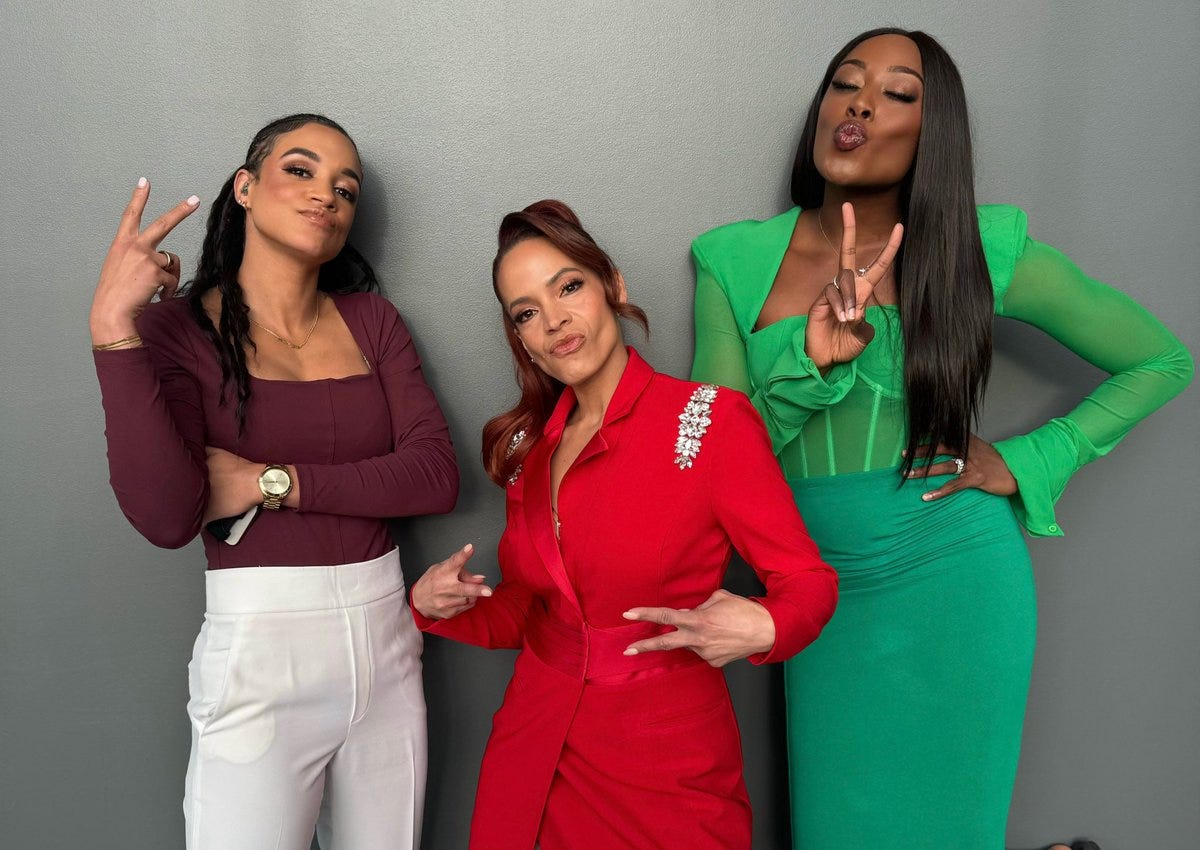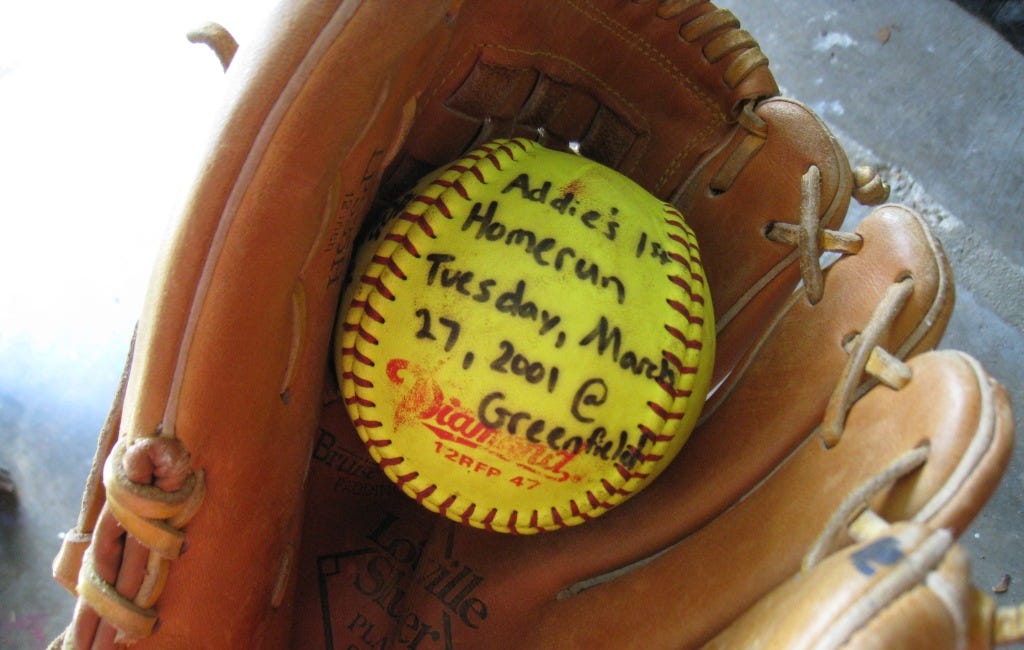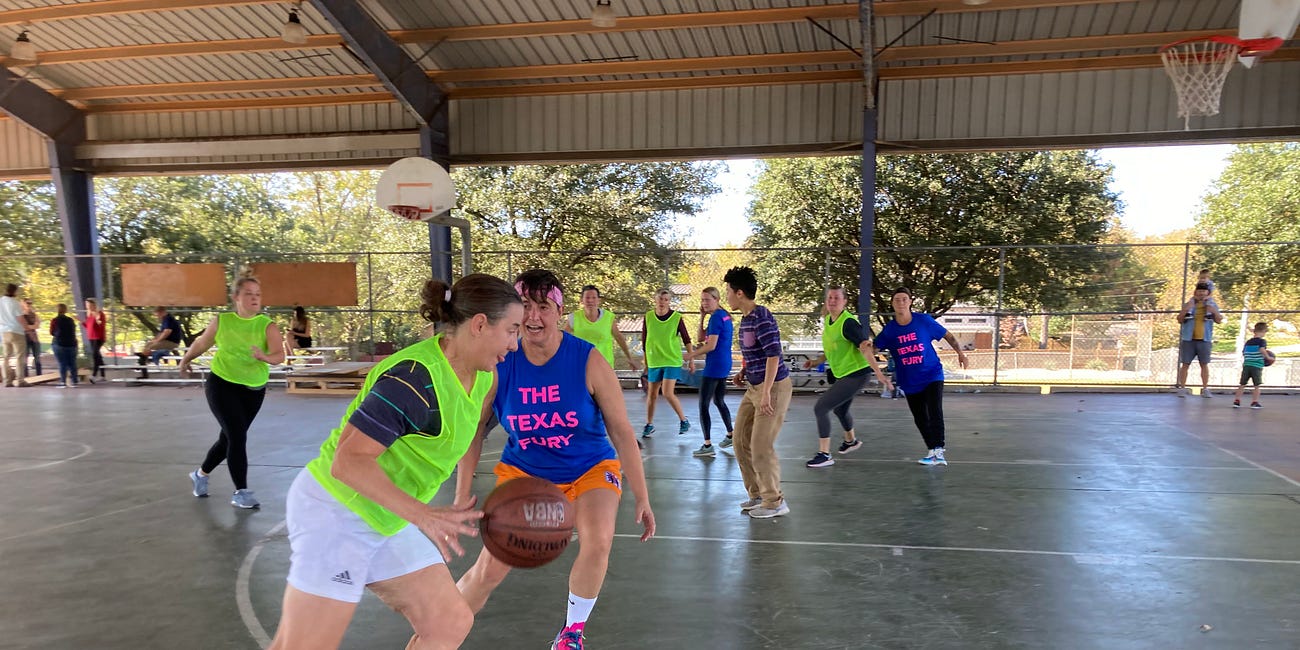Ladies, you built this game
With March Madness at an all-time high, it's time to honor the ballers (and wannabes) who came before.

I’ve been caught up in March Madness this past week, and I heard something right before Monday’s game between Iowa and LSU that stopped me in my tracks.
ESPN analyst Elle Duncan was signing off with her co-hosts Chiney Ogwumike and Andraya Carter, who have been stealing pregame hearts all tournament.
They were tossing to the game, where Caitlin Clark and Angel Reese were going head-to-head in a rematch of last year’s title game. Duncan knew that a whole lot of people were watching her in that moment, and she wasn’t going to let it pass.
As the transition music started to play in the background, Duncan talked directly to viewers. I couldn’t grab a pen fast enough to type what she said, so I’m going to have to paraphrase.
As we head into one of the most anticipated games in women’s basketball history, I want to take a second and address all the players out there who gave their blood, sweat and tears for this sport, all those hours on the court to lay the foundation for what you are about to watch tonight.
Ladies, you built this game for these women to play. This is your night, too.
I’d never heard a sports analyst break the fourth wall that way, delivering a message to a particular segment of her viewing audience, all those women who had practiced lay-ups until they couldn’t miss, high-fived their teammates when they did, and wiped the dirt off the bottom of their shoes with their bare hands so they didn’t slide all over the court in their two-year-old Converse high-tops.
All those fans who showed up, game after game, long after they graduated from college. (Like my buddies Belinda Hare, Dorsey Barger and Susan Hausmann who haven’t missed a game in decades and are kind enough to ask me to join them from time to time.)
She wanted them to know — she wanted us to know — that no matter how small our contribution, every player, every parent, every season ticket holder, every coach who had anything to do with getting young girls on the court and developing their talent along the way had played a role in creating this monumental tournament.
The game drew more than 12 million viewers, an incredible number by any measure. That’s more than any MLB game last year and all but one NBA game.
But as my pickup basketball buddy Fran Harris said on Facebook, don’t forget that Cheryl Miller’s Southern Cal team drew 11 million viewers in their title win over Louisiana Tech in 1983.
A few years later, Harris led the Longhorns to their first and only national championship title with an undefeated streak that still hasn’t been replicated at UT.
She’s an entrepreneur, producer, and business coach now, bubbling with ideas and energy that top-tier collegiate athletes have in spades.
You know what else they have?
A sense of legacy.

Harris’ post echoed what Duncan said on Monday night. Women’s basketball has been around for a long time, and many people have been dedicated to the sport without the sponsorships, endorsement deals, and the 24-hour media spotlight.
And there’s a lot to learn about intersectional feminism by paying attention to how these players and their respective teams are being covered right now.
I’m glad that the LA Times reporter apologized for the terrible column about the LSU team. I was moved listening to UCONN star Paige Buecker’s 2021 ESPYs acceptance speech, where she, a white player, took the sports media world to task for not covering Black players. The only opinion I have about Kim Mulkey is that if I faced what she’s faced in her career, I wouldn’t be the nicest person on the court either. (She was the subject of a lengthy Washington Post article recently, written by a man, that asked what cost she pays to be the best coach in college basketball. Since when has the world cared what cost women pay to climb to the top?)
As the Final Four and Championship games take place over the next few days, keep an eye out for how we are talking about these players, their coaches, and this game.
What I know is that every single player, from the elementary school kids playing in the park league to the Division III players whose names will never be broadcast on television, had people making sacrifices so they could play. There are other star players besides the ones being pitted against each other as hero-and-villain.

And note that the person at the center of that attention still hasn’t reached the 4,061 point career total that Pearl Moore, a Black player for Francis Marion College, scored in the late 1970s. That’s not to discount anyone’s talent, but the Greatest Of All Time is only the GOAT until the next person comes along.
Clark said it herself in a commercial for Gatorade, one of her many NIL partners. “If I can drop 40, you can drop 50,” she tells viewers. “If we can draw 56,000 fans, you can draw 57,000.”
I did this so you can do it, too.
Any game could be many of these women’s last. Every team that loses in these final games has players who will walk off that floor and never play competitive basketball again.
All of us walk away from something for a final time at some point. All of us leave behind a team and skills we worked hard to acquire to evolve into another version of ourselves.
One day, Caitlin Clark and Angel Reese will be talking about that part of their stories.

I’ve written a number of times about how gender disparity, tribalism, and capitalism turned me off from sports for a long time, but it’s times like these when my cynical heart thaws enough to remember that people really do play sports for the love of the game and to be part of a legacy of something much greater than themselves.
With the career opportunities, scholarships, and now endorsement deals, love isn’t the only reason they play, but big moments call for a reminder of what’s at the heart of any game and, dare I say, a little ancestral reverence.
Thank you, Elle Duncan, for reminding us what that looks like.
Happy eclipse weekend! I’ll re-share that story I wrote about the 2017 eclipse and report back about this one next week.
Take good care, wear your eclipse glasses, and remember who will remember you one day.
Addie
Related on The Invisible Thread:
Title IX and a tale of two tomboys
I had a sport for every season when I was a kid. It started with soccer, basketball and softball and transitioned into volleyball, racquetball and even a little Ultimate Frisbee. I was a player who could chew and spit sunflower seeds like it was my job, a fan who knew every player on the Bulls' roster and, at my first newspaper, a cub reporter covering …
Part 2: She goes hard in the paint
Basketball was never my favorite sport, but it was a big part of my life as a kid. Part of this is because the Southwest Missouri State (now Missouri State) Lady Bears were a top NCAA basketball team in the 1990s, so we went …






Great read, Addie!